Congratulations, New Students! (2024 Entrance Ceremony)
April 6, 2024
On Saturday the 6th of April, the 2024 Academic Year Entrance Ceremony was held.
TUFS welcomed 353 new students (including 11 transfer students) to the School of Language and Culture Studies, 372 (including 9 transfer students) to the School of International and Area Studies, 77 to the School of Japan Studies, 131 into the Master’s and Doctoral Programs of the Graduate School of Global Studies – a grand total of 933 new students.
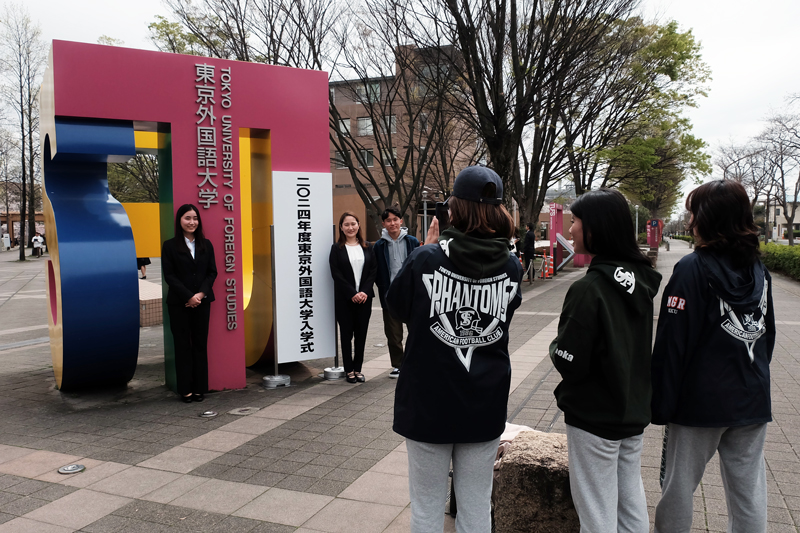
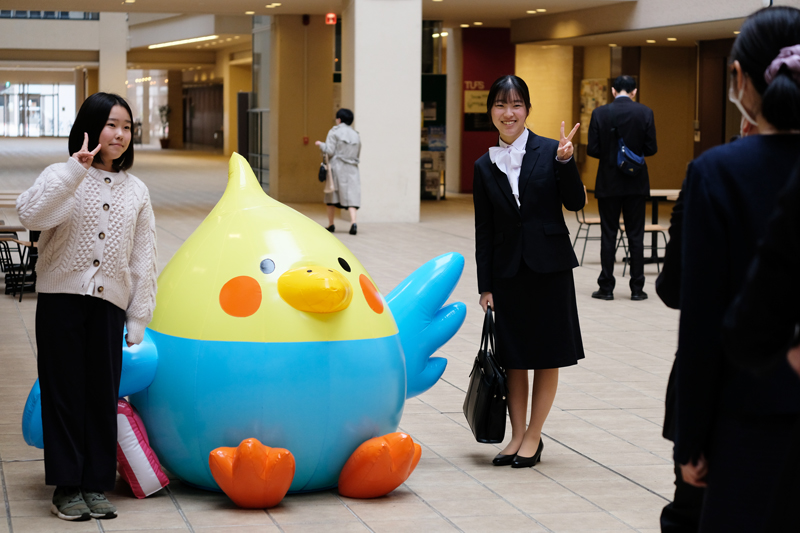
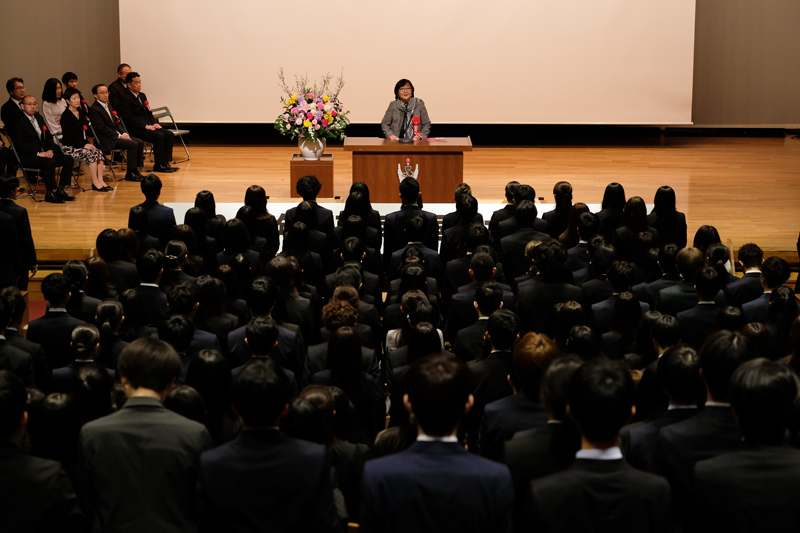
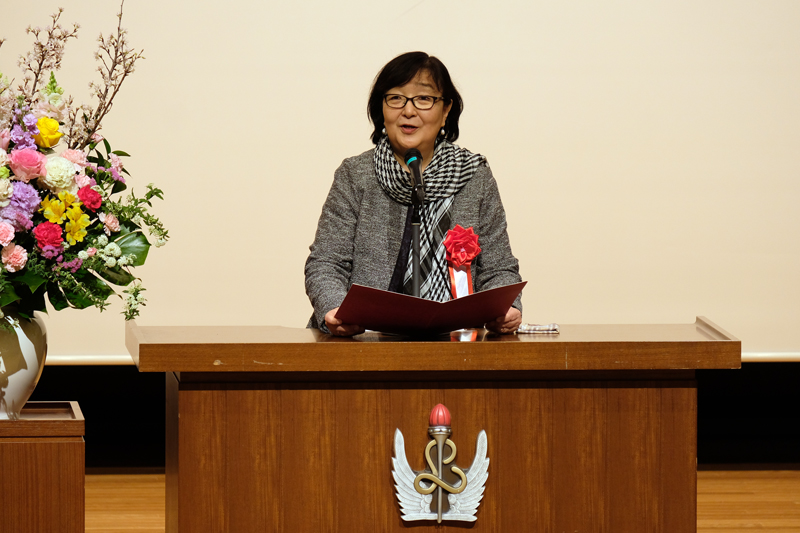
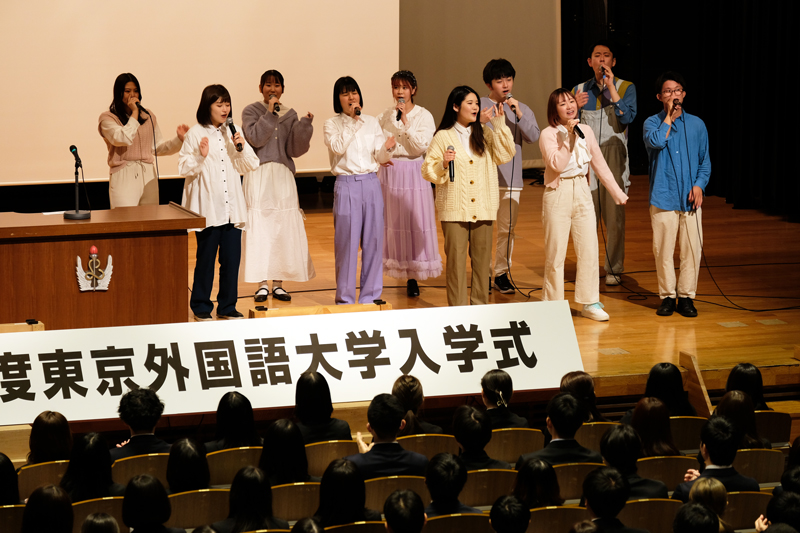
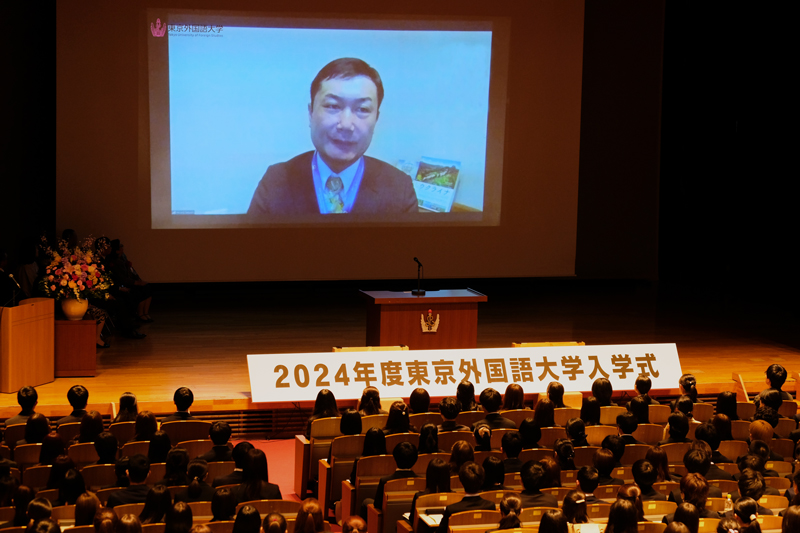
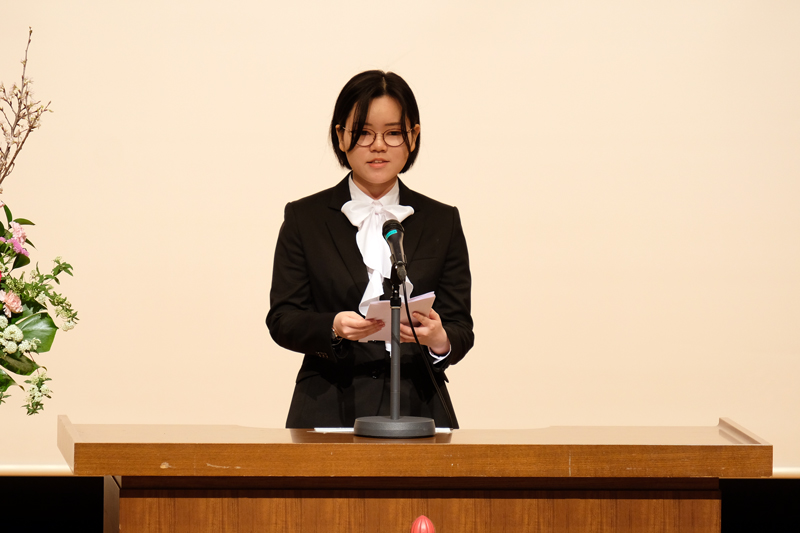
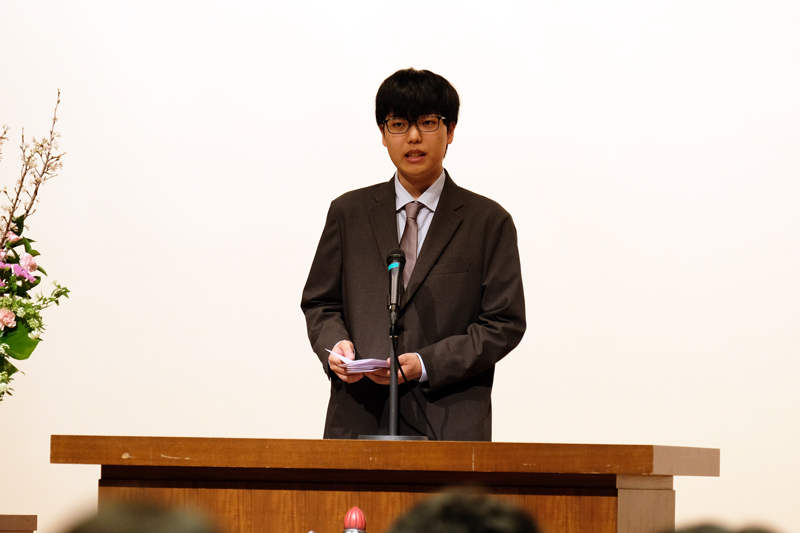
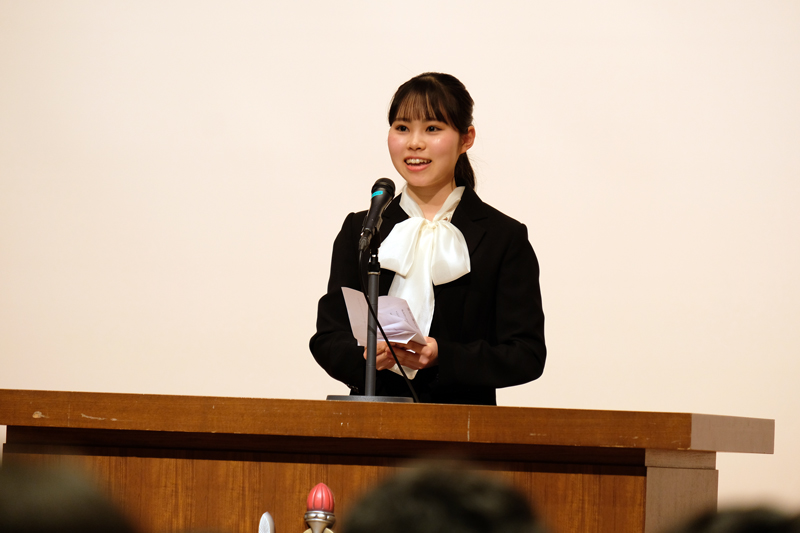
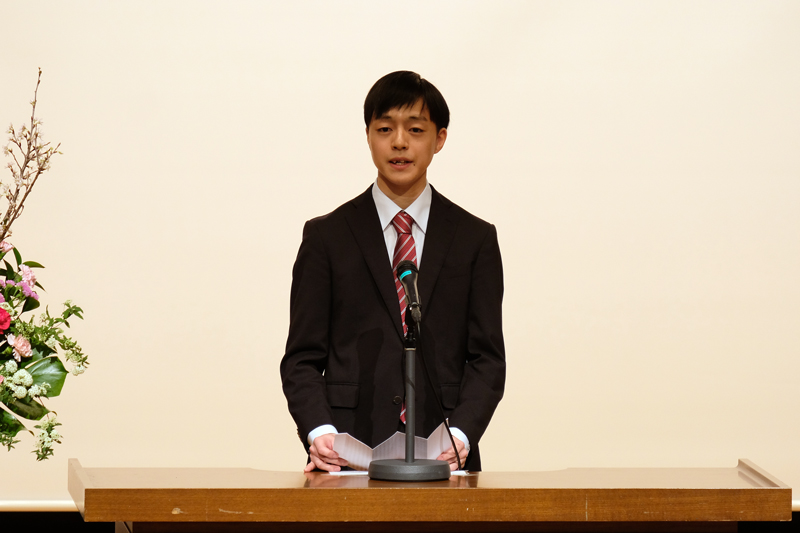
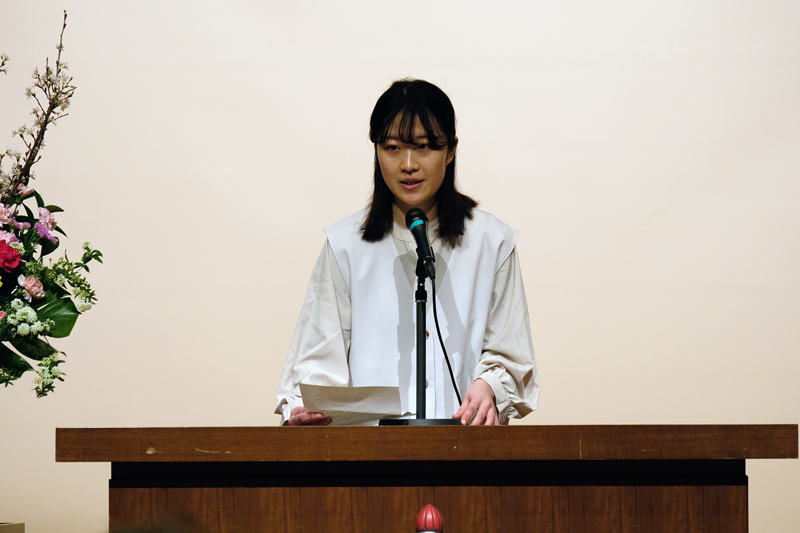
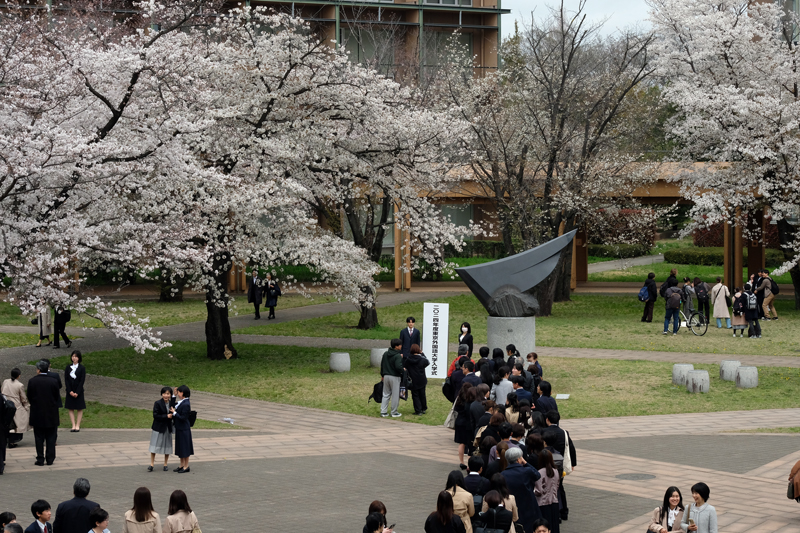
2024 Entry Ceremonial Address from the President (for undergraduate students)
Congratulations everybody on your matriculation at Tokyo University of Foreign Studies.
Last year, TUFS celebrated the 150th anniversary of its foundation. This year we have entered our 151st year. This 150 years of history can be divided into four periods. The first is the early years of the Meiji Period. Japan was trying to absorb Western culture and our school was a window for learning about the world. We educated interpreters, translators of foreign books, and foreign language teachers who worked all over Japan. It is well known that the poet Nakahara Chuya studied at our school, aiming to become a French teacher.
The second period is the long period of war. As Japan advanced into Asia, our school was expected to educate people who would operate overseas in industry and the military. As a result, many people from our school fell victim to the war. Among them was Yamamoto Hatao, who studied Russian at our school. He worked in the Research Section at the Manchurian Railway and died while interned in Siberia after the war. Yamamoto was the model for the main character in the film Fragments of the Last Will starring Ninomiya Kazunari. It is just the representation in the film, but even during the middle of the war he still tried to interact with others as equals. You can just picture him as one of our graduates.
The third period is that of Japan’s postwar economic growth. In diplomatic missions and the overseas offices of Japanese businesses, it is fair to say that there were always graduates of our school playing an active role. This was the era of the Japanese businessman. It was an era in which the majority of graduates were male, so it is OK to say businessmen. Now, both female and male graduates are playing an active role in workplaces around the world.
And into the 21st century our university is confronting a new global phase. Amidst globalization, national borders are lowering and people are interacting more. TUFS today is in an era when the world is becoming more multilingual and multicultural.
But, in the last 10 or 20 years there have been many large changes, too. There was a time of bright hope. But, under neoliberalism, the gap between rich and poor has widened, and we are in an era when grievances explode into various forms of terrorism. Also, I sense that the scars of the Covid-19 pandemic changed people around the world to being more inward-looking. Now, there are many populist political leaders asserting the interests of only their own nation or group, and it has become more difficult to use our common sense and good sense as human beings. It is already two years since the beginning of the invasion of Ukraine by the Russian military. The violent rule over the residents of Palestine by Israel has already been continuing for 70 years, but a level of violence unprecedented in that history is now being carried out before our very own eyes.
In this kind of era, what can we do as people studying at TUFS? We at Tokyo University of Foreign Studies do not think of such impossible big questions as someone else’s job but as our own job. This is our duty living in this fourth period of our university’s long history.
All problems and issues occur because people, or groups with whom people respectively identify as “us”, come into contact and interact with each other. If people never left the places where their own languages are used or the places they were born, perhaps instead of no progress there would be no problems occurring. But humans act, come into contact with each other, and compete with each other.
In this context, the people who connect with others while avoiding conflict are “intermediaries”. They understand the languages of others, and through that are able to accept the positions and thoughts of others. These are people who have the imagination and empathy to understand others. However, “intermediaries” are not just expected to play the role of a go-between. They need to have goodwill and good faith, and to lead us in the right direction.
To begin with, in order to listen to what others say, to understand them, and to connect with them, people must have space in their hearts to accept others. And what gives you the good will and good faith to do that is the education that you receive. The learning at our university is designed to be good preparation for such a future.
At Tokyo University of Foreign Studies, which you have just entered, we have the world on campus. At this university we have people who think of the problems in Ukraine, Gaza, Myanmar or the United States as their own. And we have people who think and act from various perspectives about a world rocked by war. This is where the particular characteristic of TUFS lies. We are a small university. I congratulate you on becoming members of our university with people from all around the world, but at the same time hope we will all do our best together.
I sincerely hope that all of you studying at our university from now on will have imagination and empathy, and that you will play a role in doing something to stop the endlessly continuing differentiations and divisions within our world. Have great resolve, and please have a most fruitful university life.
Once again, I congratulate you on your matriculation.
-
Kayoko Hayashi
President, Tokyo University of Foreign Studies
April 6, 2024
2024 Entry Ceremonial Address from the President (for graduate students)
Congratulations on your matriculation at the graduate school. 97 people have entered a master’s program, and 34 people a doctoral program. From today, everyone is a member of the Graduate School of Global Studies at TUFS.
In the world of the graduate school that you are entering today, everyone is treated as being somewhere between a student and a researcher. You pay tuitions fees, are told to do this and that by the university, and attend lessons and take exams in order to obtain grades. In this sense you are students. On the other hand, you have to decide your own research topic. You are aiming to write a thesis. In this sense, you are treated as researchers. Your professors will be of support in some matters, but not in others. Some professors are involved closely in your progress, while others give you much free time. I am sure that professors will look at your personalities and adjust accordingly, but more than anything else you need to develop your own path for yourself. In any case, please build relationships of trust with your professors and other colleagues in your field, and please put your heart and soul into developing your research theme and pushing ahead with your research over the two years it takes to complete your master’s program, or the three years for the doctoral program. I hope that you will take the first steps from today. The theses that you are going to write will all become “a part of you”. That is the nature of postgraduate study.
What I mean by “a part of you” is the following. I think that the questions everyone is asking in their theses are questions that emerged from within you and for which you felt an answer was needed. As we go through our lives now, there are countless things about which we have doubts, or we wonder why things are the case, or we want to correct, or we want to be in a particular way. The questions that you are asking at the graduate school level all come from these sorts of thoughts. Our research questions in the humanities and social sciences emerge from those sorts of questions that we have while living our lives as human beings. All of your questions as individual researchers are part of this bigger picture.
In this way, the various disciplines within the social sciences and humanities are very important things for our lives as human beings. To begin with, people and their minds are full of riddles and it is our nature that we should seek answers. In this age in which we are living, technology is advancing, artificial intelligence is changing the way people live, and we are entering an age in which AI-equipped weapons can select humans to kill. But we as living beings have not changed that much. The feelings of mourning for family members and loved ones killed in war has not changed at all from, for example, the grief of the leading figures in the ancient world.
In the world right now there are countless problems. It is already two years since the beginning of the invasion of Ukraine by the Russian military. The violent rule over the residents of Palestine by Israel has already been continuing for 70 years, but a level of violence unprecedented in that history is now being carried out before our very own eyes. However, the world is unable to stop these things, and the number of people killed just keeps on rising.
The reason that the victims of war increase is that research into the technology used for weapons is advancing. The people who research technology do not wish for this outcome, of course. I believe that even they want, if possible, for research in the humanities and social sciences to clarify the historical roots of problems and build the international order, to identify problems from the perspectives of ethics, values and responsibility, and to stop people from killing each other. Research in the humanities and social sciences impacts on the future of humanity.
The emotions and selfishness of humans do not change, and in the academic disciplines which deal with our unchanging nature we must have a debate about the potential for human societies not ruled by technology. What are human beings exactly, and what is human happiness? These are questions that can be answered via humanities and social sciences research.
In such ways, all of your research is connected to the future of our society. With that perspective and vision, I want you to work hard on your postgraduate research. I believe that your research is connected to society and has the power to change society.
I pray that all of your will have a fulfilling life while at graduate school, and congratulate you once again on your matriculation at the Graduate School of Global Studies.
-
Kayoko Hayashi
President, Tokyo University of Foreign Studies
April 6, 2024
